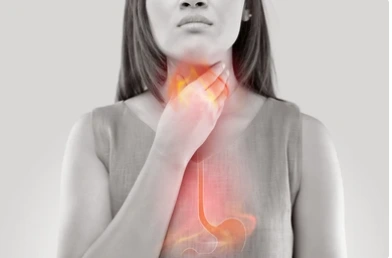
Acid Reflux - Root Causes of Gastroesophageal Reflux Disease (GERD)
The first thing we need to talk about is the fact that heartburn and acid reflux or gastroesophageal reflux (GERD) are not the same thing. Heartburn simply means a burning sensation in your chest. Acid reflux is when stomach contents, including stomach acid, flow backwards into the esophagus. While acid reflux does cause heartburn, all heartburn is not necessarily acid reflux.
So the first question you need to ask is have I been diagnosed properly? Is my heartburn actually GERD?
Other disorders that may have heartburn as a symptom include bile reflux, laryngopharyngeal reflux, reflux hypersensitivity, rumination syndrome, eosinophilic esophagitis, esophageal motility disorders, gastric and duodenal ulcers, gallstones, and more.
So the first step is to make sure you have the right diagnosis. The standard of care in conventional medicine is to prescribe acid suppressing medication (usually a proton-pump inhibitor like Prilosec) when a patient complains of heartburn. No workup, just a pill. Because, if it burns, that must be too much stomach acid, right? Not necessarily, as we will get into.
To better understand the symptoms of heartburn, an endoscopy and a pH impedance test are incredibly helpful. First, the pH impedance test can actually tell you whether or not it is GERD, functional heartburn, or reflux hypersensitivity.
To understand the difference between these conditions, you need to understand that reflux can be physiological (aka normal) or pathological. We all experience reflux after we eat. It is completely normal for a small amount of food and fluid to reflux from the stomach into the esophagus without symptoms. We have protective mechanisms such as a mucus that prevent this small amount of reflux from causing symptoms. This is physiological reflux. If the reflux amount becomes larger or more frequent, that is when it can overcome the protective mechanisms and start causing symptoms - this is pathological reflux.
Functional heartburn is when the reflux is physiological and symptoms of pain do not correlate to reflux. Reflux hypersensitivity is when it is a normal amount and frequency of reflux (physiologic reflux), but it does cause symptoms. This happens due to failure of the protective mechanisms. GERD involves abnormal reflux - more frequent and large volume. Symptoms of heartburn may or may not correlate to the reflux events in GERD.
If you do have GERD, an endoscopy can then assess the damage to the esophagus - this will determine if your GERD is erosive or nonerosive. If you don’t have GERD, an endoscopy can assess for eosinophilic esophagitis, ulcers, bile reflux, H. pylori and more in the context of heartburn.
Additional testing that can be helpful in assessing heartburn and GERD includes:
- Cytosponge and EsoGuard for assessing for Barrett’s esophagus and esophageal cancer instead of an endoscopy
- BRAVO Test to measure pH changes in the esophagus instead of the pH impedance test (this test does not involve a nasal catheter like the pH impedance test but it cannot detect nonacid reflux)
- Esophageal manometry to assess for esophageal motility and tone of the esophageal sphincters
- Salivary pepsin test to predict whether GERD or laryngopharyngeal reflux is present
- Heidelberg testing to assess acidity of stomach acid
- Gastric emptying studies to assess for gastric motility disorder
Please note that at home testing such as the baking soda test, lemon water test, and betaine hydrochloride titration are not accurate ways to assess stomach acid AT ALL.
So let’s say your doctor has actually ordered some testing and you get a true diagnosis of GERD. Why are your stomach contents traveling backwards into your esophagus? Causes include:
- Weak lower esophageal sphincter
- Transient lower esophageal sphincter relaxations (TLESRs)
- Abnormal esophageal motility
- Delayed gastric emptying
- Increased pressure in the abdomen
- Structural issues like hiatal hernia
Lower Esophageal Sphincter (LES)
This is a muscle that controls the movement of food from the esophagus into the stomach. When you swallow food, it should open so that food can move into the stomach and then it should close to keep the food in the stomach. If the LES is weak, abnormal reflux can occur. A common reason for a weak LES is different medications such as beta-agonists used to treat asthma, calcium channel blockers used for high blood pressure, some anti-diarrheals, narcotics, progesterone, and sedatives such as benzodiazepines.
Other things that can relax the LES include smoking, alcohol, and foods like fat, peppermint, caffeine, coffee, chocolate, citrus, garlic and onions. The LES can also be dysfunctional if there are issues with the diaphragm.
Transient lower esophageal sphincter relaxations (TLESRs)
TLESRs are relaxations of the LES that are not associated with swallowing. They are triggered by distention of the stomach. Increased pressure in the stomach may come from eating large meals or abnormal gas production in the small intestine. TLESRs last longer than a typical relaxation of the LES when swallowing, so they increase risk of GERD.
Esophageal Motility
Issues with the muscles, connective tissue or nervous system could result in the esophagus not able to push food efficiently to the stomach. Scleroderma, Parkinson’s, ALS, multiple sclerosis, muscular dystrophy, myasthenia gravis, polymyositis, stroke, and thyroid dysfunction could all cause esophageal dysmotility leading to GERD.
Delayed Gastric Emptying
If the stomach is not able to empty properly, that can result in GERD. Causes of delayed gastric emptying include diabetes, lupus, hypothyroidism, scleroderma, Parkinson’s, stroke, traumatic brain injury, certain medications, connective tissue disorders such as hyper mobile Ehlers Danlos, dysautonomia, and more.
Increased Abdominal Pressure
If there is too much pressure below the diaphragm, that can overpower the LES resulting in reflux. Causes of increased abdominal pressure include increased visceral fat, pregnancy, build up of stool in the large intestine, breath holding, and excess gas in the small intestine from bacterial overgrowth (small intestine bacterial overgrowth - SIBO).
Hiatal Hernia
A hiatal hernia is when the upper portion of the stomach rises into the chest, so the diaphragm is no longer supporting the LES. Without the support of the diaphragm, the LES is weak, increasing the risk of GERD.
What about H. pylori?
The relationship between H. pylori and GERD is subject to debate. Many studies have actually found less GERD in people with H. pylori.1 Certain types of H. pylori increase the risk of ulcer, which could cause the symptom of heartburn. But remember, heartburn is not GERD though it all might feel the same to you. So routine testing for H. pylori for heartburn is not recommended. Some studies show that treating H. pylori increases reflux.1
What about stomach acid?
It is a common myth that people with GERD have high stomach acid. Most patients with GERD are never tested for the pH of their stomach acid. Doctors who do test stomach acid report that only 20% have excess stomach acid, while 60% have low stomach acid, and 20% have normal stomach acid. Basically, too much reflux at any pH (even alkaline) can cause pain. So while treating the stomach acid may help with symptoms, it does not fix anything. In fact, there may be many risks of reducing your stomach acid, especially long term. This may include nutrient deficiencies and imbalances in the microbiome.
So if you experience heartburn, talk to your doctor about testing to determine if your heartburn is actually reflux or something else. If you do have GERD, work with your doctor to figure out why you have reflux, thinking and treating beyond stomach acid.
References
- Scida S, Russo M, Miraglia C, Leandro G, Franzoni L, Meschi T, De' Angelis GL, Di Mario F. Relationship between Helicobacter pylori infection and GERD. Acta Biomed. 2018 Dec 17;89(8-S):40-43. doi: 10.23750/abm.v89i8-S.7918. PMID: 30561416; PMCID: PMC6502218.
- Sandberg-Lewis, Steven. Let’s Be Real About Reflux. Fourth Lloyd Productions. 2023.
Categories: acid reflux GERD Tags: acid reflux GERD
